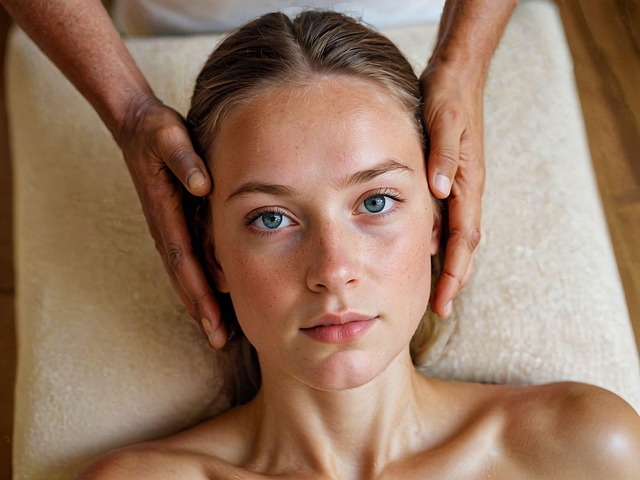Cold water therapy, through exposure to cool or cold temperatures, offers numerous advantages for skin health. It reduces inflammation, calms complexions, stimulates collagen production, enhances elasticity, and has antibacterial properties, making it ideal for sensitive and acne-prone skin. Incorporating cold water into skincare routines via face washes or ending showers with cold water can lead to a glowing, clear complexion, tighten the skin, minimize fine lines and puffiness, and promote overall dermatological wellness.
Unleash the power of cold water for a youthful glow and discover its anti-aging secrets! This article delves into the science behind cold water’s remarkable effects on skin health. From understanding the physiological benefits to exploring various cold water therapies, you’ll learn how to incorporate this natural treatment into your skincare routine.
We’ll guide you through targeted strategies for specific skin concerns, offering expert advice on safety and best practices to ensure optimal results without irritation. Embrace the transformative power of cold water for a radiant complexion.
The Science Behind Cold Water and Skin Health
The science behind cold water and its impact on skin health is an intriguing area of study that has gained significant attention in the beauty world. Cold water therapy, a practice that involves exposing the skin to cool or cold temperatures, offers a range of benefits for maintaining and improving skin condition. When you apply cold water to your face, it causes blood vessels to constrict, leading to reduced inflammation and a calmer, more serene complexion. This process can help in minimizing the appearance of redness and irritations, making it particularly beneficial for those with sensitive or acne-prone skin.
Additionally, regular use of cold water for facial washing or rinsing can stimulate collagen production, a protein essential for maintaining skin elasticity and firmness. Collagen is often referred to as the “fountain of youth” due to its role in smoothing fine lines and wrinkles. The cold temperature helps tighten skin, reducing puffiness and promoting a more youthful glow. It’s not just about aesthetics; cold water also has antibacterial properties that can help combat acne-causing bacteria on the skin’s surface.
– Exploring the physiological effects of cold water on the skin
The physiological effects of cold water on the skin are a fascinating area of study within the realm of dermatology and wellness. When cold water comes into contact with the skin, it triggers a series of reactions that can offer numerous benefits for skin health. One of the key mechanisms involves constricting blood vessels, which helps reduce inflammation and puffiness, making it particularly appealing for those seeking to minimize facial redness or combat fluid retention. Additionally, the cold temperature can stimulate collagen production, leading to improved skin elasticity and a more youthful appearance.
Beyond these immediate effects, regular exposure to cold water can strengthen the skin’s protective barrier, enhancing its resistance to environmental stressors and promoting overall skin health. For acne-prone individuals, cold water therapy can be a game-changer. The cooling effect calms inflammation associated with blemishes, while the improved circulation contributes to clearer, more radiant skin. Incorporating a cold water face wash into your daily routine not only offers these anti-aging benefits but also provides a refreshing sensation that leaves the skin feeling revitalized and balanced.
– How cold water tightens skin and reduces puffiness
Cold water has long been recognized as a natural remedy for various ailments, and its benefits extend to skin health as well. When used in facial routines, cold water can significantly tighten the skin, minimizing the appearance of fine lines and wrinkles. This is primarily due to the vasoconstriction that occurs when the skin is exposed to cold temperatures—blood vessels narrow, reducing blood flow to the surface of the skin. As a result, the skin contracts, leading to a smoother and firmer texture.
Furthermore, cold water can help reduce puffiness around the eyes and face. The quick cooling effect can constrict dilated blood vessels, providing an instant de-puffing effect. For those with acne-prone skin, a cold water face wash can also be beneficial. The cold temperature helps to calm the skin, reducing inflammation and minimizing redness often associated with breakouts. This simple yet powerful technique is a popular choice among many beauty enthusiasts seeking a natural way to enhance their skin’s glow and overall health.
Cold Water Therapy for Glowing Skin
Cold water therapy has gained popularity as a natural way to enhance skin health and promote a radiant complexion. One of its most celebrated benefits is its ability to give you that coveted ‘glowing’ skin. When used as part of your skincare routine, cold water can help tighten and tone the skin, reducing the appearance of fine lines and wrinkles. The shock of cold water constricts blood vessels, providing an instant lifting effect on the face.
This simple yet powerful technique is especially beneficial for those with acne-prone skin. Cold water helps to soothe inflammation and reduce puffiness around the eyes and face. By incorporating a cold water face wash or ending your shower with a splash of cold water, you can boost circulation, improve skin texture, and create a more even complexion. It’s an easy and cost-effective way to transform your skin and unlock its natural radiance.
Cold water isn’t just refreshing; it’s a powerful tool in the quest for youthful, radiant skin. By harnessing the science-backed benefits of cold water therapy, from skin tightening and reducing puffiness to its potential to calm acne-prone skin, you can achieve a glowing complexion that looks and feels its best. Incorporate cold water face washes or refreshing splashes into your skincare routine to unlock these anti-aging advantages and witness a noticeable metamorphosis in your skin’s health and appearance.
